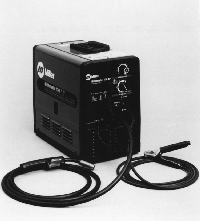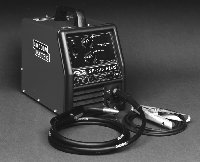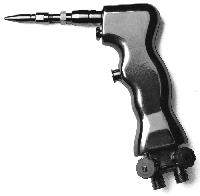published in ANVIL Magazine, March 1999 Question: In today’s high-tech world, is it safe to say that farriers and blacksmiths no longer need the forge-welding skills of previous generations? Well, maybe. The statement has a lot to do with tradition, basic skills and, most importantly, a shift in the marketplace toward specialized products: prefabricated bar shoes of all types, factory-made clips, widgets of all shapes and types, as well as a need for efficiency in a profit-generated world. For blacksmiths, the key issues may be either design or installation oriented, particularly in on-site ornamental applications. This article is not designed to buck tradition; forge welding is a viable and necessary skill, but let’s face it - a buzz box can and will help you get home for dinner, and further, will co-exist nicely with the inherent obstacles in on-site installation work.
In the bad old days, (the 1970s), a horseshoer had maybe three brands of shoes: Diamond, Multi Products, or Izumis. The Japanese shoes were manufactured with long, squared branches that could be made into bar shoes. They still had to be welded, though, and if you didn’t have the luxury of an oxyacetylene outfit, then you popped them into the coal forge (yes, coal - gas forges were still somewhat experimental) and hoped for the best. And aluminum? Aside from Walt Koepisch experimenting at Dutchtown Forge, most farriers were either trying to avoid black lung disease or searching for the mystery clinker - the one that was constantly screwing up that perfect weld. The only time we welded aluminum was when we cooked a shoe and it ended up glued to the firebox. Blacksmiths face a similar conundrum for in spite of all the skill they incorporate in creating a gate or railing or staircase, they are still going to have to install their artwork on-site—the limitations as to power supply or practicability virtually built into the equation. Technology has stepped in, particularly in the 120-volt marketplace with a number of new, portable machines, highly specialized for on-the-job applications that do not require rewiring someone’s house, i.e., being able to plug them into a standard outlet. Most are wire welders (so-called migs), but there are also a number of small stick welders and specialized oxyacetylene outfits that are lightweight. The latter is suitable for welding both aluminum and steel, as well as cutting applications as precise as plasma, finesse being the key advantage. And most importantly, like cell phones and CD players, the prices have dropped precipitously over the years, making them extremely affordable. So how does one decide what is best for a particular business application? A lot depends on the nature of your business. Key issues to decide include the availability of electricity at your average stop, whether the majority of your work is steel or aluminum (racetrack work versus saddle horse applications), how much borium or hard facing you may use, and importantly, at least in the case of 120V units, if you also plan to use the machine in outside applications that involve structural integrity (say a trailer hitch). Regardless of a manufacturer’s claims, these units are not designed - due to penetration limits - to guarantee structural integrity in high-stress applications. But they are perfect for what many of us do: horseshoeing. What are the applications? Heartbars, z-bars, medication plates, large clips or plates, building caulks or rims, lateral/medial supports, even rebuilding things like the worn toes on difficult-to-make shoes. Railing installations, gates, latches—virtually any job that cannot be completed in a shop. The former are particularly important in the dog days of August, when you can either spend an hour making new shoes or two minutes rebuilding a toe. The same applies to a horse that starts banging behind and may need an outside caulk - do you want to make new shoes or simply stack a caulk with a wire welder? The same principle applies to something as simple as a stripped screw-caulk hole: make a new shoe or simply rebuild the bad hole by filling and re-tapping. Time is money and, for the most part, it’s your money. More importantly, at least in the case of blacksmithing, is the installation of the finished product; are you willing to haul out a generator-operated 240V unit to the hinterland to hang a gate? How does that impact the profit margin? A few things to remember about 120V wire welders. Most need a 20-amp circuit to work efficiently, common in most new construction, though a 15-amp circuit will work if you don’t push the project too fast. The downside is that you may blow somebody’s circuit breaker. Extension cords should be 10 or 12 gauge and not over 100 feet in length, as all cords create a certain degree of electrical resistance. Smaller gauge cords completely defeat the advantage of a 120V system. For horseshoeing applications, most dealers recommend using a shielding gas, either CO2 or a CO2-argon mix. Flux-cored wire is available, but it tends to deteriorate when exposed to moisture during periods of inactivity - quite common if the unit is kept in a truck. Like oxyacetylene, the tank should be kept upright and very well secured in the truck. One major advantage to wire welders is that they are almost “idiot-proof,” meaning that you do not need a great deal of welding experience. Unlike stick welders, the unit is not activated until the trigger is pushed, allowing for precise and accurate welding. They can also be “turned down” to accommodate lower-gauge materials like sheet metal. All of the wire welders reviewed in this article are also designed to handle aluminum applications, though most dealers readily admit that it is sometimes difficult to “push” aluminum wire in the units. Added to this drawback is the fact that the wire spool will obviously have to be changed with each application. This is of course time-consuming, reinforcing the notion that the nature of your business should dictate the type of equipment used. A relatively new option is the Henrob 2000, available through McGill Distribution, Simpsonville, South Carolina. This is a standard oxyacetylene outfit with some interesting differences. The unit has a small, precise torch, operates on equal parts of oxygen and acetylene, and a lower PSI (4). It is particularly useful for welding aluminum, though equally at home with steel. The fuel efficiency of this unit makes it possible to carry smaller tanks, the versatility a bonus when either steel, aluminum or borium applications fall under your business umbrella. Plus, the unit does not require electricity. How to decide? Again, look at your business needs. Welders weld, but don’t cut. Oxyacetylene units both cut and weld. In some cases, your business needs may require both applications. Look around, talk to a few dealers or other shoers before you decide. In three months, you will wonder how you ever got along without one. Suppliers
Lincoln Electric
Miller Electric Manufacturing, Inc.
Hobart Welding Products
McGill Distribution Credits: For this article, assistance was provided by Jim Simmons, Inside Sales, Airgas, Inc., Olympia, WA and Don Knight, District Manager, Miller Electric, Auburn, WA
Return to the Blacksmithing Articles listing page. Return to the ANVIL Online Table of Contents for March, 1999.
|



